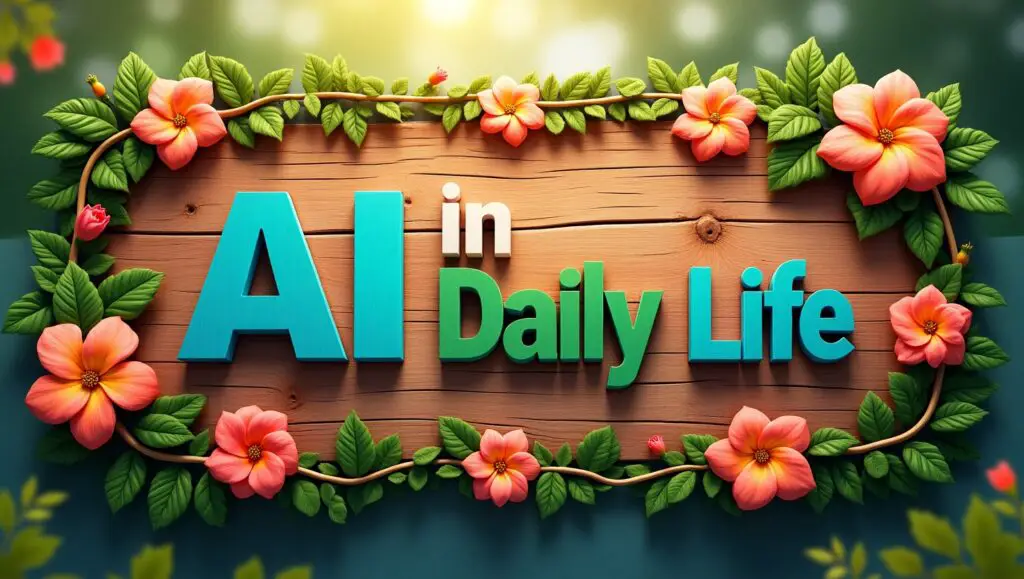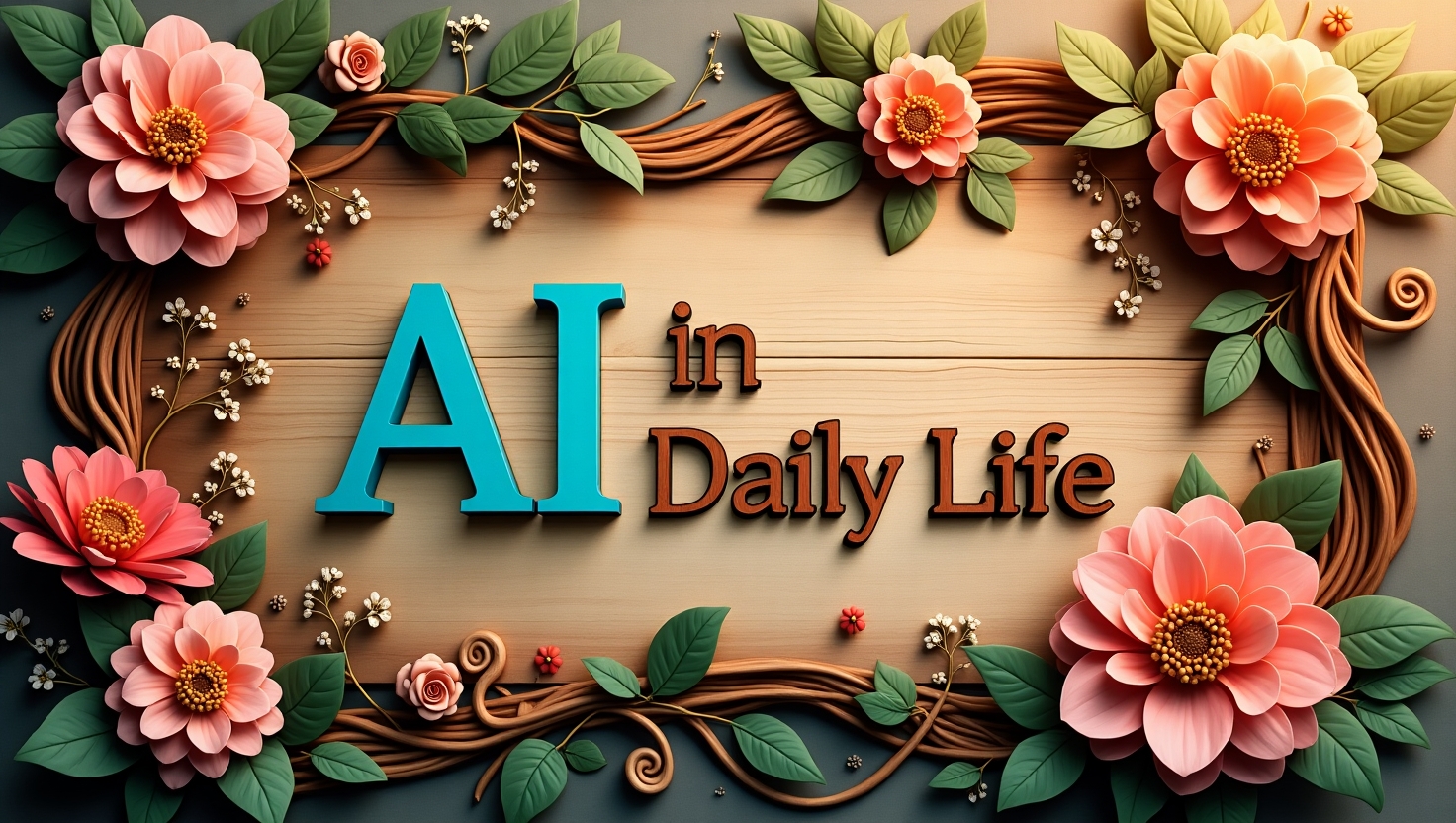This article examines the advantages of artificial intelligence (AI), how it is incorporated into daily tasks, and what the future may bring for this ground-breaking technology.
How Does AI Operate and What Is It?
The ability of software and robots to simulate human intelligence is known as artificial intelligence. Artificial intelligence (AI) systems require little human input to evaluate data, identify patterns, learn from mistakes, and make judgments. AI is used in voice assistants like Siri and Alexa as well as in recommendation algorithms on YouTube and Netflix to make jobs quicker, smarter, and more effective.
AI encompasses a number of subfields, including computer vision, machine learning, and natural language processing, each of which contributes in a different way to the advancement of commonplace technologies.

AI’s Practical Uses in Everyday Life
- Virtual assistants and smartphones
Smartphones are become clever personal assistants thanks to AI. Artificial intelligence (AI) is used by voice recognition software such as Google Assistant, Apple’s Siri, and Amazon Alexa to respond to queries, send texts, set alarms, and manage smart home appliances. AI is also used extensively in predictive text and language translation applications to improve user experience. By 2025, smartphones will have sophisticated AI chips that enable real-time data processing, facial recognition security, and even health monitoring capabilities like mood analysis and heart rate detection.
IoT devices and smart homes
Smart home systems driven by AI are becoming commonplace in contemporary homes. Smart homes provide efficiency and convenience in everything from lighting and thermostat control to increased security via AI-powered cameras. Home automation has become nearly instinctive thanks to gadgets like Google Nest and Amazon Echo that gradually learn customer preferences. AI-enabled refrigerators, for example, can streamline time and effort by reminding you when you’re running low on supplies or suggesting recipes based on items that are available.- Fitness and Health
AI has a big impact on individual healthcare. AI is used by fitness applications and wearable technology, such as the Fitbit and Apple Watch, to monitor heart rates, sleep patterns, and physical activity. Based on your data, they provide real-time health alerts, food recommendations, and customized exercise regimens. Additionally, telemedicine services and AI-powered health chatbots enable people to schedule appointments, get medical advice, and keep an eye on chronic illnesses from the convenience of their homes. - E-commerce and shopping
Have you ever noticed how internet retailers appear to “know” what you want? Product recommendations on websites like Amazon, eBay, and Flipkart are powered by artificial intelligence. These systems display products that you are more likely to buy based on an analysis of your browsing history, tastes, and behaviour. AI chatbots are also taking the place of traditional customer support, responding to inquiries, helping with orders, and managing grievances around-the-clock. - Navigation and Transportation
AI has completely changed the way we travel. AI is used by apps like Waze and Google Maps to identify the quickest routes by analyzing traffic patterns. AI is used by ride-hailing services such as Uber and Careem to connect drivers and riders, compute fares, and predict arrival times. Although they are not yet common, self-driving cars are being tested in large cities. These self-driving cars promise safer and more effective travel in the near future by using AI to understand their environment, follow traffic laws, and prevent collisions.

Learning and Education
AI is used by online learning systems such as Khan Academy, Coursera, and Duolingo to give students individualized learning routes. AI is able to suggest exercises, modify information according to performance, and pinpoint areas in which a student is having difficulty. AI is assisting educators in the classroom by automating grading, monitoring student progress, and even providing specialized teaching resources for students with learning disabilities. AI’s Benefits for Daily Life
Convenience: AI saves time and effort by automating repetitive chores. Efficiency: Intelligent algorithms decrease human error and increase accuracy. Personalization: AI personalizes everything from shopping lists to tunes. Accessibility: AI-driven solutions make it easier for individuals with disabilities to engage with the outside world. Cost Savings: AI lowers operating expenses in sectors including healthcare, logistics, and customer service. Problems and Issues
Notwithstanding its advantages, AI also brings up significant issues: Privacy: The sensitive data that AI gathers needs to be shielded from abuse. Job Displacement: Automation is transforming the labour market and may eventually displace certain human positions. Bias: AI systems may generate unfair or discriminating outcomes if they are trained on biased data. Governments and tech companies must enforce ethical AI practices and transparency to guarantee AI benefits everyone.
What Will AI’s Role in Everyday Life Be?
AI is predicted to become even more ingrained in our daily lives in the near future. The possibilities are boundless, ranging from emotionally intelligent robots to personal tutors driven by AI. Even individuals and small enterprises will use AI to increase creativity and productivity as technology becomes more widely available. Concluding remarks
Artificial intelligence is altering not only how we use technology but also how we live. By 2025, artificial intelligence is pervasive in our homes, automobiles, offices, and pockets. Although there are obstacles to overcome, there is no denying AI’s potential to improve daily life. AI will remain a useful ally in our everyday lives as long as we employ it sensibly and morally. SEO keywords: AI in everyday life, AI in 2025, real-world AI applications, AI in smart homes, AI in healthcare, AI in smartphones, AI in the future, daily applications of AI, AI-powered technology, and AI’s influence on day-to-day living. Please let me know if you would want a version that is geared for a particular readership, such as students, tech aficionados, or others! Has this discussion been beneficial thus far?
The idea of artificial intelligence (AI) is no longer confined to sci-fi films. By 2025, artificial intelligence has permeated every aspect of our existence, from smart homes and cellphones to healthcare and education. AI is subtly changing how we work, communicate, shop, travel, and even make decisions, whether we are aware of it or not. It is more crucial than ever to comprehend AI’s expanding role in our daily lives as technology develops.
This article examines the advantages of artificial intelligence (AI), how it is incorporated into daily tasks, and what the future may bring for this ground-breaking technology.
How Does AI Operate and What Is It?
The ability of software and robots to simulate human intelligence is known as artificial intelligence. Artificial intelligence (AI) systems require little human input to evaluate data, identify patterns, learn from mistakes, and make judgments. AI is used in voice assistants like Siri and Alexa as well as in recommendation algorithms on YouTube and Netflix to make jobs quicker, smarter, and more effective.
AI encompasses a number of subfields, including computer vision, machine learning, and natural language processing, each of which contributes in a different way to the advancement of commonplace technologies.

AI’s Practical Uses in Everyday Life
- Virtual assistants and smartphones
Smartphones are become clever personal assistants thanks to AI. Artificial intelligence (AI) is used by voice recognition software such as Google Assistant, Apple’s Siri, and Amazon Alexa to respond to queries, send texts, set alarms, and manage smart home appliances. AI is also used extensively in predictive text and language translation applications to improve user experience. By 2025, smartphones will have sophisticated AI chips that enable real-time data processing, facial recognition security, and even health monitoring capabilities like mood analysis and heart rate detection.
IoT devices and smart homes
Smart home systems driven by AI are becoming commonplace in contemporary homes. Smart homes provide efficiency and convenience in everything from lighting and thermostat control to increased security via AI-powered cameras. Home automation has become nearly instinctive thanks to gadgets like Google Nest and Amazon Echo that gradually learn customer preferences. AI-enabled refrigerators, for example, can streamline time and effort by reminding you when you’re running low on supplies or suggesting recipes based on items that are available.- Fitness and Health
AI has a big impact on individual healthcare. AI is used by fitness applications and wearable technology, such as the Fitbit and Apple Watch, to monitor heart rates, sleep patterns, and physical activity. Based on your data, they provide real-time health alerts, food recommendations, and customized exercise regimens. Additionally, telemedicine services and AI-powered health chatbots enable people to schedule appointments, get medical advice, and keep an eye on chronic illnesses from the convenience of their homes.
E-commerce and shopping
Have you ever noticed how internet retailers appear to “know” what you want? Product recommendations on websites like Amazon, eBay, and Flipkart are powered by artificial intelligence. These systems display products that you are more likely to buy based on an analysis of your browsing history, tastes, and behaviour. AI chatbots are also taking the place of traditional customer support, responding to inquiries, helping with orders, and managing grievances around-the-clock.- Navigation and Transportation
AI has completely changed the way we travel. AI is used by apps like Waze and Google Maps to identify the quickest routes by analyzing traffic patterns. AI is used by ride-hailing services such as Uber and Careem to connect drivers and riders, compute fares, and predict arrival times. Although they are not yet common, self-driving cars are being tested in large cities. These self-driving cars promise safer and more effective travel in the near future by using AI to understand their environment, follow traffic laws, and prevent collisions.
Learning and Education
AI is used by online learning systems such as Khan Academy, Coursera, and Duolingo to give students individualized learning routes. AI is able to suggest exercises, modify information according to performance, and pinpoint areas in which a student is having difficulty. AI is assisting educators in the classroom by automating grading, monitoring student progress, and even providing specialized teaching resources for students with learning disabilities. AI’s Benefits for Daily Life
Convenience: AI saves time and effort by automating repetitive chores. Efficiency: Intelligent algorithms decrease human error and increase accuracy. Personalization: AI personalizes everything from shopping lists to tunes. Accessibility: AI-driven solutions make it easier for individuals with disabilities to engage with the outside world. Cost Savings: AI lowers operating expenses in sectors including healthcare, logistics, and customer service. Problems and Issues
Notwithstanding its advantages, AI also brings up significant issues: Privacy: The sensitive data that AI gathers needs to be shielded from abuse. Job Displacement: Automation is transforming the labour market and may eventually displace certain human positions. Bias: AI systems may generate unfair or discriminating outcomes if they are trained on biased data. Governments and tech companies must enforce ethical AI practices and transparency to guarantee AI benefits everyone.
What Will AI’s Role in Everyday Life Be?
AI is predicted to become even more ingrained in our daily lives in the near future. The possibilities are boundless, ranging from emotionally intelligent robots to personal tutors driven by AI. Even individuals and small enterprises will use AI to increase creativity and productivity as technology becomes more widely available.
Concluding remarks
Artificial intelligence is altering not only how we use technology but also how we live. By 2025, artificial intelligence is pervasive in our homes, automobiles, offices, and pockets. Although there are obstacles to overcome, there is no denying AI’s potential to improve daily life. AI will remain a useful ally in our everyday lives as long as we employ it sensibly and morally.: AI in everyday life, AI in 2025, real-world AI applications, AI in smart homes, AI in healthcare, AI in smartphones, AI in the future, daily applications of AI, AI-powered technology, and AI’s influence on day-to-day living.



